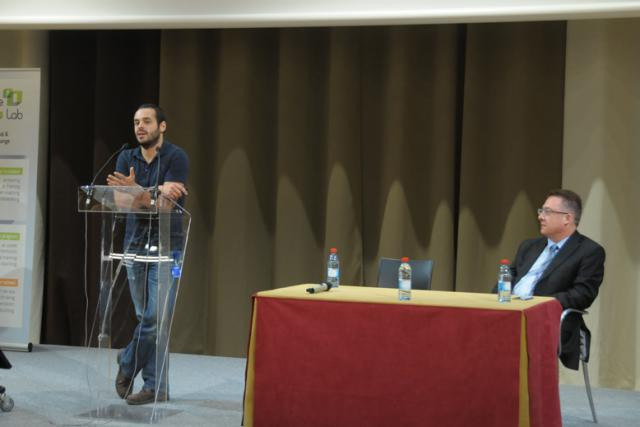Yesterday, on September 22, 2016, lux future lab held its second FinTechMeets at BGL BNP Paribas in Kirchberg, focusing on what has become a hot topic: big data and how to harness it.
Roughly 350 IT and financial professionals attended the lunchtime gathering, which centered on a global overview of big data, machine learning and its practical applications.
Jonathan Basse, founder of Data Essential, and Jed Grant, CEO & founder of KYC3, shared their insights based on years of experience developing solutions that access this wealth of information.
In order to understand the significance of this topic, it is important to first grasp what the big in big data really means, which is exactly where Basse kicked off the event. He noted that an astonishing four zettabytes (ZB) of data exist, 90% of which was created in the last two to three years. By 2020, that number is projected to multiply to 44ZB.
In terms of rice kernels, one zettabyte is enough to fill the Pacific Ocean, giving businesses of tomorrow the choice to either sink or swim.
Big data’s growing popularity in the Grand Duchy and around the globe, as seen in the event’s number of attendees, suggests that organizations already recognize this reality and are eager for solutions on how to collect, manage and analyze big data to create value.
“We are extremely pleased with yesterday’s high turnout. It’s a reflection of Luxembourg’s willingness to embrace new technologies. Big data and machine learning have the potential to result in a paradigm shift within financial services. Based on what I’ve seen today, we’ll be ready for it,” said Karin Schintgen, CEO, lux future lab.
It is true that the financial services world has taken particular notice – firstly, because the sector inherently owns large amounts of information. Every transaction is a valuable piece of data. Secondly, as Grant mentioned, banks are becoming more user-friendly and looking for ways to enhance the client experience, improve operations and provide real-time offers.
Applications of big data once it is understood range from individualized advertising to facial recognition technologies. This is where machine learning comes in. Given the large scale of data and our growing footprint, automation is required to process it all. Machine-learning algorithms organize and analyze the data at incomparable speeds.
Both speakers noted that at some point society will need to set the boundaries on what robotics will be allowed to do.
The event closed with a reflection on the challenges of regulating this rapidly changing technology so as to prevent the infringement of privacy rights, a concern echoed by the audience. For the most part, individuals do not own their data trails, whether grocery store purchases, parking lot footage, online photos or social media activity.
With 360-degree views of each customer drawn from comprehensive data, personalized propaganda could become the norm and individuals will have to make a proactive effort to stray from what they are force fed.
In the race to make sense of this data noise, businesses need to be keenly aware of the risk of crossing ethical lines and spying on the public, issues that will manifest themselves differently around the world based on politics, economics and comfort levels.
According to Grant the future has not quite arrived. Without feelings, intuition and the gut instincts so crucial to human interaction, machines are still far from intelligent.
The third FinTechMeets of the year will be held on November 24, 2016. More information will follow at luxfuturelab.lu.
